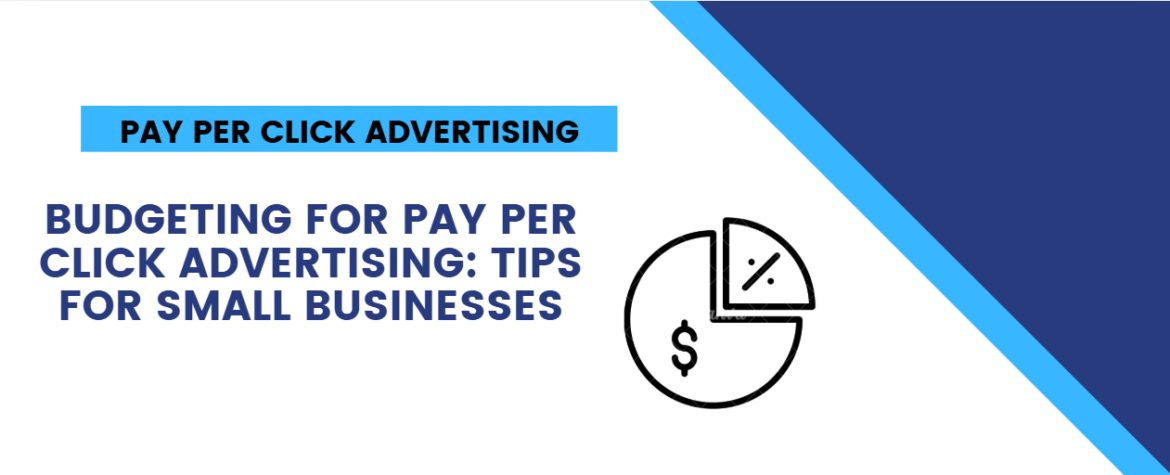Pay Per Click (PPC) advertising can be an incredibly effective way for small businesses to drive traffic and increase sales. However, it’s easy to get overwhelmed when it comes to budgeting for your PPC campaigns. How much should you spend? How do you make sure you’re getting the best return on investment (ROI)? Let’s break it down with some practical tips to help small businesses make the most of their PPC budget.
1. Set Clear Goals for Your Campaign
Before you start spending money on PPC, it’s important to define what you want to achieve. Are you looking to generate more website traffic? Increase sales? Build brand awareness? Having clear goals will help you allocate your budget more effectively.

- Traffic Goals: If your goal is to drive traffic to your website, you may focus on keywords with lower competition, which could cost less per click.
- Conversion Goals: If you want to increase sales or leads, you may need to invest in more targeted keywords, which might cost a bit more but could bring in higher-quality clicks.
- Brand Awareness Goals: For building brand recognition, you might choose broader keywords and use display ads, which are typically more affordable.
2. Start Small and Test
When you’re just starting with PPC, it’s important to start with a smaller budget and test different strategies. This allows you to figure out what works best for your business before committing a larger amount of money.

- Daily Budget: Start with a daily budget that you’re comfortable with, even if it’s as little as $5 or $10 per day. This will give you the chance to test your ads without risking too much money.
- A/B Testing: Run A/B tests on your ads to see which ones perform best. Test different headlines, ad copy, and calls to action. This will help you optimize your ads and get the best results for your budget.
3. Focus on Long-Tail Keywords
Long-tail keywords are longer, more specific search terms that often have less competition and a lower cost per click. For small businesses, targeting long-tail keywords can be a great way to stretch your PPC budget while still reaching a highly relevant audience.

For example, instead of bidding on a broad keyword like “shoes,” you might bid on a more specific phrase like “comfortable running shoes for women.” These keywords are more likely to bring in users who are further down the buying funnel and ready to make a purchase.
4. Use Negative Keywords
Negative keywords are words or phrases that you don’t want your ads to show up for. Using negative keywords helps you avoid wasting money on irrelevant clicks and ensures your ads only appear to people who are genuinely interested in your product or service.

For example, if you sell premium shoes, you might add “cheap” or “discount” as negative keywords to avoid clicks from people looking for lower-priced options.
5. Monitor and Adjust Your Campaigns Regularly
PPC advertising isn’t a “set it and forget it” strategy. You need to monitor your campaigns regularly to see how they’re performing and make adjustments as needed. If a certain keyword is getting clicks but not converting, you might want to adjust your bid or pause that keyword altogether.

- Conversion Tracking: Set up conversion tracking to measure the success of your ads. This will help you see which keywords and ads are driving the most sales or leads.
- Adjust Your Budget: If you find that certain ads or keywords are performing well, consider reallocating more of your budget to those areas. On the other hand, if something isn’t working, don’t be afraid to pause it and try something else.
6. Consider Seasonal Trends
Many businesses experience seasonal fluctuations in demand, and your PPC budget should reflect this. If you know that your products or services are in higher demand during certain times of the year, you may want to allocate more of your budget during those periods.

For example, if you sell winter coats, you might want to increase your PPC budget during the fall and winter months when people are more likely to be searching for them.
7. Optimize for Mobile
More and more people are shopping and browsing on their mobile devices, so it’s important to ensure that your PPC campaigns are optimized for mobile. Ads that are mobile-friendly can lead to higher click-through rates (CTR) and better conversion rates.

- Responsive Ads: Make sure your ads look great on both desktop and mobile devices. Google Ads and other platforms offer responsive ads that automatically adjust to fit different screen sizes.
- Mobile Bidding: Some platforms allow you to set mobile-specific bids, which can help you target mobile users more effectively.
8. Use Remarketing to Get More from Your Budget
Remarketing allows you to show ads to people who have already visited your website but didn’t convert. This is a great way to get more value from your PPC budget by targeting users who are already familiar with your business and may be more likely to convert.

Remarketing can be highly cost-effective because you’re targeting a more qualified audience. Consider running remarketing campaigns alongside your regular PPC ads to boost your ROI.
9. Track Your ROI
One of the most important aspects of budgeting for PPC is understanding your return on investment (ROI). You need to know how much you’re spending and how much you’re earning in return. This will help you make smarter decisions about your budget and ensure you’re getting the best possible results.

- Calculate ROI: To calculate your ROI, subtract your PPC costs from your revenue, then divide by your PPC costs. The formula looks like this:
ROI=Revenue−CostCost×100text{ROI} = frac{text{Revenue} – text{Cost}}{text{Cost}} times 100
If your ROI is positive, you’re on the right track. If it’s negative, you may need to adjust your strategy.
10. Consider Working with a PPC Expert
If you’re unsure about managing your PPC campaigns on your own, it might be worth working with a PPC expert or agency. They can help you optimize your budget, choose the right keywords, and get the best results from your campaigns.

While hiring an expert might involve an upfront cost, it could save you money in the long run by ensuring that your campaigns are set up correctly and are running efficiently.
Conclusion
Budgeting for PPC advertising doesn’t have to be complicated, but it does require careful planning and ongoing management. By setting clear goals, starting small, focusing on long-tail keywords, and regularly monitoring your campaigns, you can make the most of your budget and drive meaningful results for your small business.
Remember, PPC is all about testing, optimizing, and adjusting to find what works best for your business. With the right approach, you can make every dollar count and watch your business grow!


